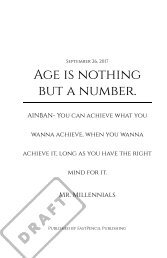4+Magazine+Issues+(Corcoran,+Ferriss,+Huffington,+Gary+Vee)
Create successful ePaper yourself
Turn your PDF publications into a flip-book with our unique Google optimized e-Paper software.
Q<br />
FOUNDR: Scientific<br />
data has suggested that<br />
the modern way of life<br />
is damaging. (Stressrelated<br />
illness is the<br />
leading cause of doctors’<br />
visits in the UK). Why<br />
then is the third metric a<br />
new discovery in the age<br />
of information? Why as a<br />
species have the majority<br />
of us opted to live in a<br />
way that is fundamentally<br />
unfulfilling to us?<br />
AH: We are living through an incredible time, when<br />
modern science is validating a lot of ancient wisdom.<br />
That’s why, in Thrive, I’ve included 55 pages of<br />
endnotes to convince even the most stubborn skeptic<br />
that we need to unplug, recharge and reconnect with<br />
ourselves, and by doing so, actually improve every<br />
aspect of our lives.<br />
So many of us have opted to live in a way that’s<br />
fundamentally unhealthy and unfulfilling because, as a<br />
society, we have been operating under the collective<br />
delusion that burning out is the necessary price for<br />
accomplishment and success. Recent scientific<br />
findings make it clear that this couldn’t be less true.<br />
Not only is there no tradeoff between living a wellrounded<br />
life and high performance, performance is<br />
actually improved when our lives include time for<br />
renewal, wisdom, wonder and giving.<br />
Q<br />
FOUNDR: On the<br />
subject of wisdom, we<br />
seem to be informationrich<br />
and wisdom-poor.<br />
Could you explain<br />
further the paradox<br />
that connectedness<br />
isn’t making us wiser?<br />
What sort of effect have<br />
you noticed this lack<br />
of wisdom having on<br />
society?<br />
Q<br />
FOUNDR: Much of<br />
Thrive’s beauty lies in<br />
embracing the tenets<br />
of ancient philosophy<br />
and wisdom and<br />
showing how valuable<br />
and applicable it is in<br />
our lives. Was there<br />
a specific time when<br />
you came to this<br />
realization?<br />
SUCCESS STORY<br />
AH: The first stages of the Internet were<br />
about data and more data. But now we<br />
have plenty of data — indeed, we’re<br />
drowning in it — and all the distraction<br />
we could ever hope for. Technology has<br />
been very good at giving us what we want,<br />
but not always what we need. Wherever<br />
we look around the world, we see smart<br />
leaders — in politics, in business, in media<br />
— making terrible decisions. What they’re<br />
lacking is not IQ, but wisdom. Which is no<br />
surprise; it has never been harder to tap<br />
into our inner wisdom, because in order<br />
to do so, we have to disconnect from all<br />
our omnipresent devices — our gadgets,<br />
our screens, our social media — and<br />
reconnect with ourselves.<br />
AH: Growing up in Athens, I was<br />
brought up on the classics and the<br />
Greek myths. They were taught<br />
to me not as ancient history, as<br />
my children learned them in their<br />
American classrooms, but as my<br />
personal roots and the source<br />
of my identity. Athena was the<br />
goddess of wisdom, and, for me,<br />
the idea of wisdom is forever<br />
identified with her — weaving<br />
together strength and vulnerability,<br />
creativity and nurturing, passion<br />
and discipline, pragmatism and<br />
intuition, intellect and imagination,<br />
claiming them all, the masculine<br />
and the feminine, as part of our<br />
essence and expression.



